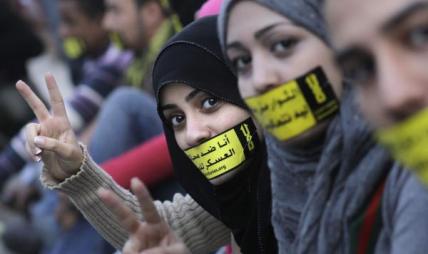The defence team of 15 individuals accused of membership of a terrorist cell have requested full access to the case’s papers in a Sunday session at the Hikestep military court.
The defendants include individuals who were part of a wave of enforced disappearances and who later appeared in a Ministry of Defence video, appearing to confess to crimes in testimonies that family members said were produced via torture.
Lawyer with the defence team Yasmin Hossam El-Din told Daily News Egypt that the case was postponed Sunday until 17 September, as four detainees were not brought to court from detention.
“We had the chance to request a full set of the case papers, so far we have not had full access and we hope to get the papers this week,” El-Din said. “This will give us the ability to see what kind of evidence is being used to charge them.”
The accused individuals appeared in a video released by the Ministry of Defence in July and broadcast online and on television. In it, the men say they were responsible for attacks on state facilities and personnel. The men tell the cameras that they were trained abroad in Syria, on Muslim Brotherhood instruction. It also claims they have attacked state facilities, including police cars and electricity pylons in Egypt. However, relatives and activists worry their testimonies may have been elicited under duress.
One individual among those speaking in the video is 22-year-old Sohaib Saad. The student is also one of five students who faced trial in the Al Jazeera retrial (also called the “Marriot Cell” trial), and he received a three year prison sentence on 29 August for conspiring with the Qatari media network’s journalists in “spreading false news”.
However, Saad was a notable case among a wave of enforced disappearances earlier this year, and he appeared in the video appearing to give the testimony weeks afterwards, prompting concerns between observers.
“The court papers will allow us to see what evidence there is, because the video is not sufficient. They are accused of possessing weapons and bullets so the prosecution will need proof,” El-Din said. “We cannot raise the issue of his enforced disappearance; there is no such crime under Egyptian law. Rather, we may raise the disappearances as proof the accused did not commit the crimes.”
Saad says in the video that, as part of his work, he purchased a weapon that was given to another member to assassinate a police officer involved in the dispersal of the Rabaa Al-Adaweya sit-in in August 2013.
Writing on Facebook after the video’s appearance, Saad’s brother Osama said: “Sohaib was kidnapped and forcibly disappeared for two weeks. Then he appeared in Tora Prison. During the time of his forced disappearance he was hung by his wrists for three full days and electrocuted all over his body. He said that he was tortured to the extent that he lost the ability to scream or faint.”
Saad’s brother also called in to question the plausibility of the video’s claims. He wrote: “Sohaib was arrested on 2 January 2014 as part of the Marriot Cell case, and was held until his release in February 2015. They released him on bail on the conditions of the police checking upon him daily. Sohaib was imprisoned for one year and two months… he was kidnapped on 1 July 2015 – when could he have undertaken these terrorist acts?”
The alleged local leader of the group is a 25-year-old man named Ahmed Amin Ghazali. In a statement to the camera, Ghazali says he ran the cell in Egypt and had previously undertaken attacks, including torching police cars.
At the time of the video, revolutionary and pro-democracy activist Mona Seif reported on Facebook that she understood at least six of the men featured in the video, including Ghazali and Saad, were abductees in a wave of hundreds of alleged disappearances in recent months.
Egypt’s judicial system has frequently been called into question, including over the absence of substantial supporting evidence for verdicts. In May, six men accused of being part of the militant ‘Arab Sharkas cell’ were executed. Prominent international NGO Human Rights Watch said that although there was evidence to prove that three of the defendants were in detention at the time the crimes were carried out, they were still charged and convicted.


